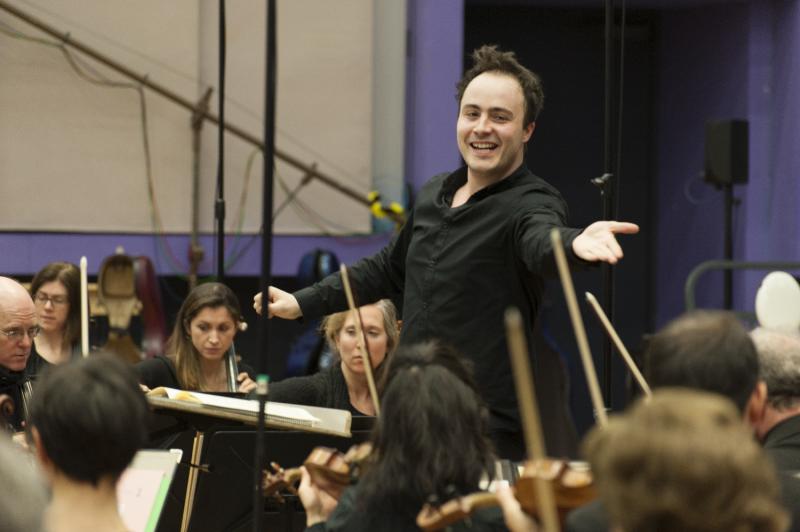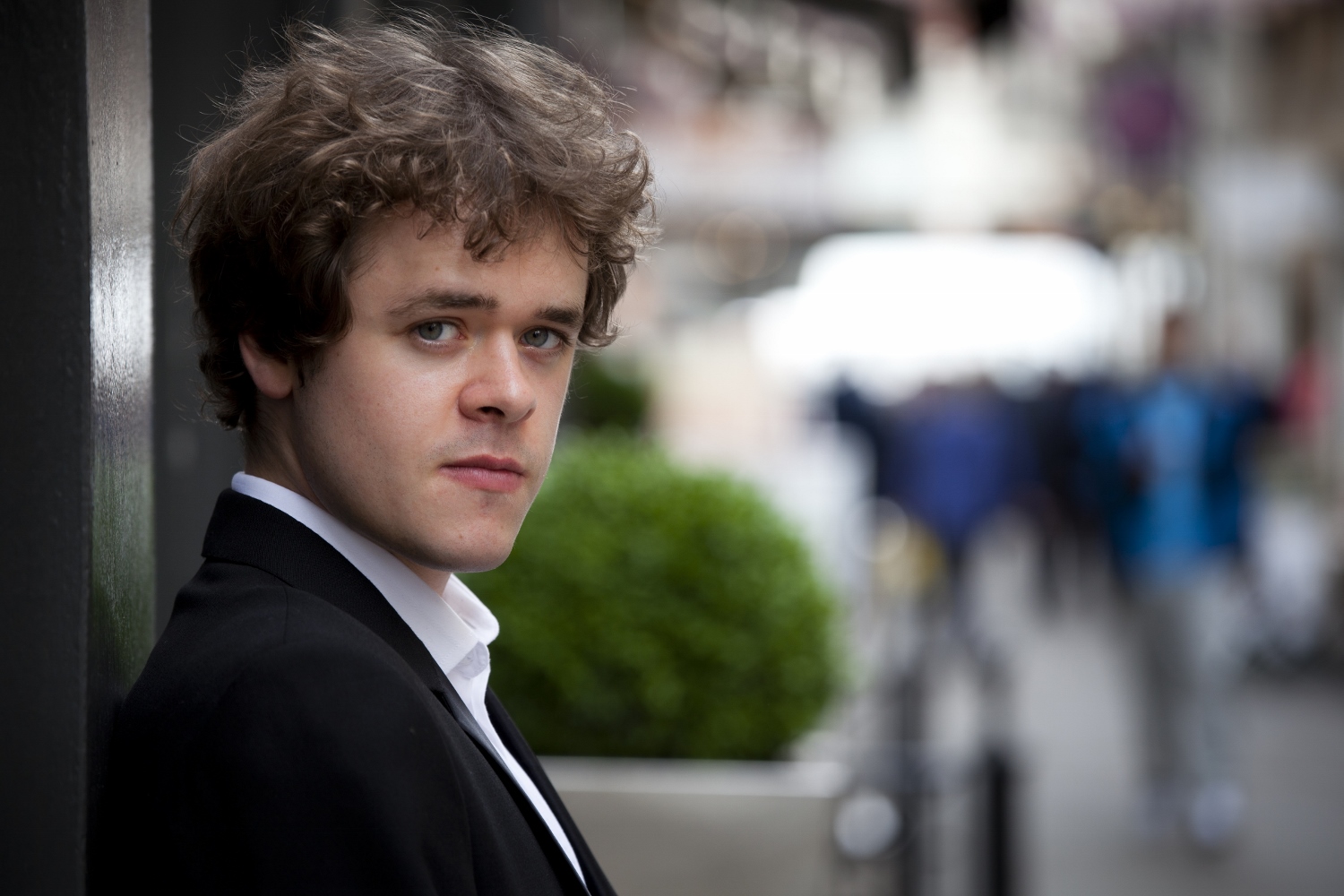Grosvenor, BBCPO, Gernon, Bridgewater Hall, Manchester | reviews, news & interviews
Grosvenor, BBCPO, Gernon, Bridgewater Hall, Manchester
Grosvenor, BBCPO, Gernon, Bridgewater Hall, Manchester
A striking debut for a new Principal Guest Conductor

Two young guys called Ben graced the BBC Philharmonic platform at the Bridgewater Hall – looking almost like Ant and Dec if you let your imagination wander. Ben Gernon, 27, had just been announced as the orchestra’s new Principal Guest Conductor (while predecessor John Storgårds now rejoices in the title of Chief Guest Conductor … it almost seems a bout of alternative facts is coming on), and this was his Bridgewater Hall début.
Stickless throughout, Gernon began with Beethoven’s Third ("Eroica") Symphony, played with what today are considered modest string forces of 41 – although three times what Beethoven had for the premiere – and with modern timpani. So it wasn’t to be a "period" performance in sound quality, but the grunt of five double basses gave real bite in the nether regions. It was, at least at first, very much in the spirit of classicism in other ways, though – brisk speeds, crisp articulation, drama in the vivid contrasts of loud and soft. Gernon managed to combine this with a degree of sophistication that is not always apparent, as the famous approach to the first movement’s reprise was all smoothness and (at the point where the horn makes his unexpected entry) he made the harmonic clash dim almost to extinction.
In my score, Beethoven apparently thought it a good idea to repeat the first movement opening section, but the BBC had set a target of 45 minutes for the duration of the entire work, so what did he know? The non-repeat actually changed the movement’s whole centre of gravity, making the coda its main musical statement – and in due course allowing the fourth movement to become the weightiest of them all. That was one stimulating aspect of Gernon’s reading – a thoroughly goal-orientated balance to a work that can alternatively be a battle of equal and opposing forces. The other was the presentation of the funeral march second movement. This was a real lament, no mere formality, the woodwind interjecting like a stabbing pain and the climax in the central episode, when it came, quite spine-tingling.
The Scherzo was fast and slick, a wild hunting ride, and tinged with growing excitement, and so the finale (with its allusion to Prometheus) came as a giant exulting in his strength. There were no doubts now: rhythmic energy and the clash of contrapuntal lines were things to revel in and served to create a magnificent rush of optimism. Grosvenor (pictured above by Patrick Allen) was soloist in Saint-Saëns’s Second Piano Concerto – a great display piece for a pianist but one that hardly usually plumbs the depths (what stays with you is the ear-worm of a second-movement scherzo). But there were depths to be plumbed, and Grosvenor found them in his tender, poetic playing of the lyrical theme in the first movement. Liaison between solo and orchestra was a little slippery at one point there, but there were no such problems in the second. Grosvenor dazzled throughout, making it not just a conventional show-off but a thing of some subtlety – in which he was matched by the BBC Philharmonic under Gernon. The finale was another tour de force for the soloist, brilliantly delivered, with the Philharmonic, mostly, keeping up.
Grosvenor (pictured above by Patrick Allen) was soloist in Saint-Saëns’s Second Piano Concerto – a great display piece for a pianist but one that hardly usually plumbs the depths (what stays with you is the ear-worm of a second-movement scherzo). But there were depths to be plumbed, and Grosvenor found them in his tender, poetic playing of the lyrical theme in the first movement. Liaison between solo and orchestra was a little slippery at one point there, but there were no such problems in the second. Grosvenor dazzled throughout, making it not just a conventional show-off but a thing of some subtlety – in which he was matched by the BBC Philharmonic under Gernon. The finale was another tour de force for the soloist, brilliantly delivered, with the Philharmonic, mostly, keeping up.
Debussy’s La Mer had the same clarity and textural control as the Beethoven symphony, though now with 62 strings (among them 12 cellos, the better to render the four-part passage where Debussy actually asks for 16 players). The Philharmonic is at its best making a rich and glorious sound with all hands on deck, leader Yuri Torchinsky played the violin solos beautifully, and the climax of "From dawn to mid-day on the sea" was very effective, if a shade over-percussive.
In the "Games of Waves" scherzo, woodwind and brass soloists showed what they were made of, too, and there was delicacy and a sense of atmosphere throughout. Gernon knows how to give his musicians the freedom to do what they do best. The finale ("Dialogue of the wind and the sea") had drama and tension from the outset, and Gernon saw the structural necessity of relaxing it, big-time, at the right moment before whipping things up again for a dynamic ending.
rating
Explore topics
Share this article
The future of Arts Journalism
You can stop theartsdesk.com closing!
We urgently need financing to survive. Our fundraising drive has thus far raised £49,000 but we need to reach £100,000 or we will be forced to close. Please contribute here: https://gofund.me/c3f6033d
And if you can forward this information to anyone who might assist, we’d be grateful.

Subscribe to theartsdesk.com
Thank you for continuing to read our work on theartsdesk.com. For unlimited access to every article in its entirety, including our archive of more than 15,000 pieces, we're asking for £5 per month or £40 per year. We feel it's a very good deal, and hope you do too.
To take a subscription now simply click here.
And if you're looking for that extra gift for a friend or family member, why not treat them to a theartsdesk.com gift subscription?
more Classical music
 First Person: Manchester Camerata's Head of Artistic Planning Clara Marshall Cawley on questioning the status quo
Five days of free events with all sorts of audiences around Manchester starts tomorrow
First Person: Manchester Camerata's Head of Artistic Planning Clara Marshall Cawley on questioning the status quo
Five days of free events with all sorts of audiences around Manchester starts tomorrow
 Goldscheider, Brother Tree Sound, Kings Place review - music of hope from a young composer
Unusual combination of horn, strings and electronics makes for some intriguing listening
Goldscheider, Brother Tree Sound, Kings Place review - music of hope from a young composer
Unusual combination of horn, strings and electronics makes for some intriguing listening
 theartsdesk Q&A: composer Donghoon Shin on his new concerto for pianist Seong-Jin Cho
Classical music makes its debut at London's K-Music Festival
theartsdesk Q&A: composer Donghoon Shin on his new concerto for pianist Seong-Jin Cho
Classical music makes its debut at London's K-Music Festival
 Helleur-Simcock, Hallé, Wong, Bridgewater Hall, Manchester review - moving lyricism in Elgar’s concerto
Season opener brings lyrical beauty, crisp confidence and a proper Romantic wallow
Helleur-Simcock, Hallé, Wong, Bridgewater Hall, Manchester review - moving lyricism in Elgar’s concerto
Season opener brings lyrical beauty, crisp confidence and a proper Romantic wallow
 Kohout, Spence, Braun, Manchester Camerata, Huth, RNCM, Manchester review - joy, insight, imagination and unanimity
Celebration of the past with stars of the future at the Royal Northern College
Kohout, Spence, Braun, Manchester Camerata, Huth, RNCM, Manchester review - joy, insight, imagination and unanimity
Celebration of the past with stars of the future at the Royal Northern College
 Jansen, LSO, Pappano, Barbican review - profound and bracing emotional workouts
Great soloist, conductor and orchestra take Britten and Shostakovich to the edge
Jansen, LSO, Pappano, Barbican review - profound and bracing emotional workouts
Great soloist, conductor and orchestra take Britten and Shostakovich to the edge
 Jakub Hrůša and Friends in Concert, Royal Opera review - fleshcreep in two uneven halves
Bartók kept short, and a sprawling Dvořák choral ballad done as well as it could be
Jakub Hrůša and Friends in Concert, Royal Opera review - fleshcreep in two uneven halves
Bartók kept short, and a sprawling Dvořák choral ballad done as well as it could be
 Hadelich, BBC Philharmonic, Storgårds, Bridgewater Hall, Manchester review - youth, fate and pain
Prokofiev in the hands of a fine violinist has surely never sounded better
Hadelich, BBC Philharmonic, Storgårds, Bridgewater Hall, Manchester review - youth, fate and pain
Prokofiev in the hands of a fine violinist has surely never sounded better
 Monteverdi Choir, ORR, Heras-Casado, St Martin-in-the-Fields review - flames of joy and sorrow
First-rate soloists, choir and orchestra unite in a blazing Mozart Requiem
Monteverdi Choir, ORR, Heras-Casado, St Martin-in-the-Fields review - flames of joy and sorrow
First-rate soloists, choir and orchestra unite in a blazing Mozart Requiem
 Cho, LSO, Pappano, Barbican review - finely-focused stormy weather
Chameleonic Seong-Jin Cho is a match for the fine-tuning of the LSO’s Chief Conductor
Cho, LSO, Pappano, Barbican review - finely-focused stormy weather
Chameleonic Seong-Jin Cho is a match for the fine-tuning of the LSO’s Chief Conductor
 Classical CDs: Shrouds, silhouettes and superstition
Cello concertos, choral collections and a stunning tribute to a contemporary giant
Classical CDs: Shrouds, silhouettes and superstition
Cello concertos, choral collections and a stunning tribute to a contemporary giant
 Appl, Levickis, Wigmore Hall review - fun to the fore in cabaret and show songs
A relaxed evening of light-hearted fare, with the accordion offering unusual colours
Appl, Levickis, Wigmore Hall review - fun to the fore in cabaret and show songs
A relaxed evening of light-hearted fare, with the accordion offering unusual colours

Add comment